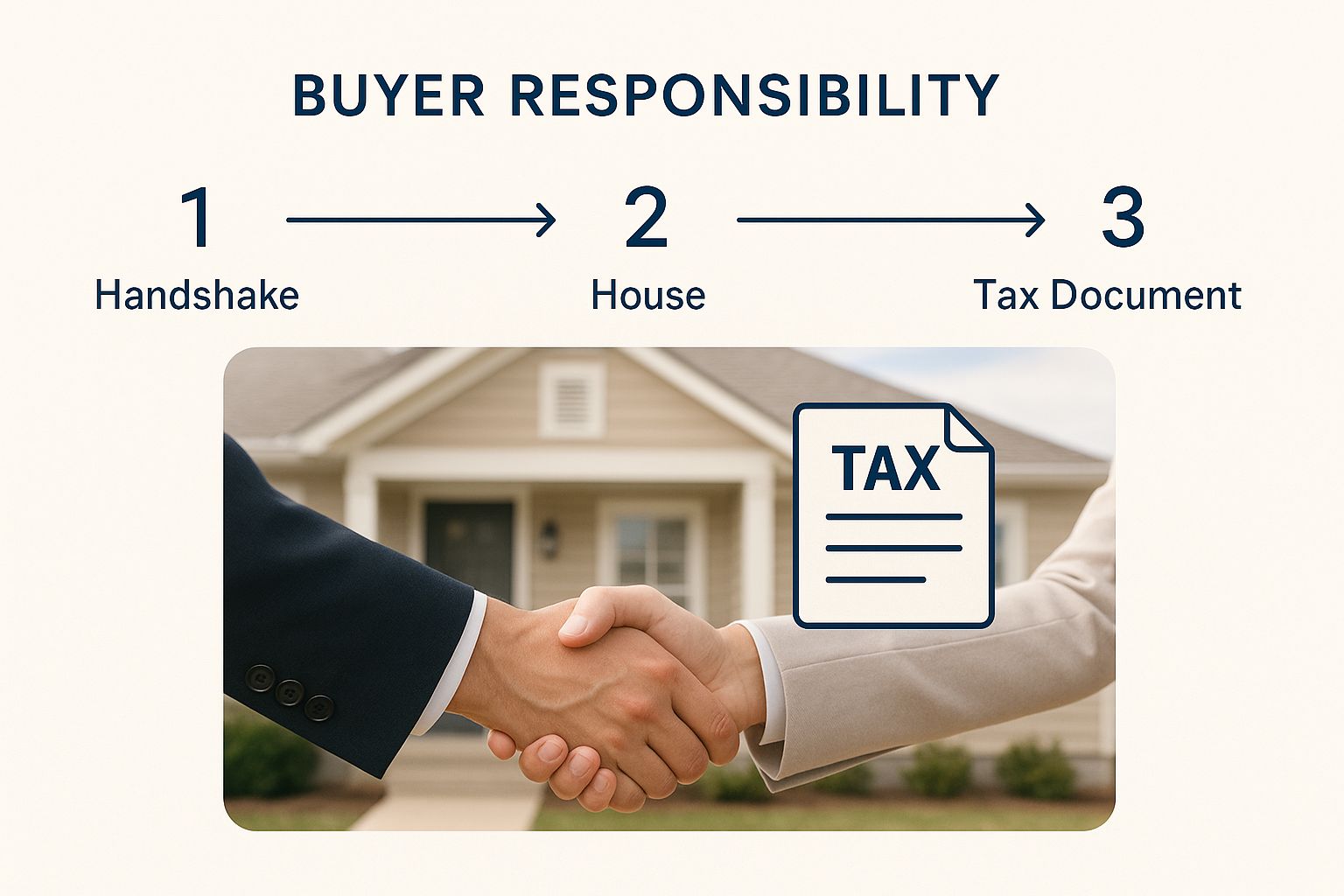When a residential property changes ownership between two parties the seller and buyer must split the payment of property taxes. The seller must pay taxes for the time they owned the property during the tax year while the buyer takes on tax responsibilities starting from the closing date. The split becomes official when the deal reaches its closing point.
The process of selling a home brings many details to handle but learning about property tax procedures will help you finish your sale successfully. The guide provides a complete explanation of the process while showing all available choices and explaining the financial responsibilities of each party.
How Property Tax Is Handled in a Home Sale

When you’re selling your house, the property tax bill is neatly divided between you and the buyer. The best way to think about it is like splitting a utility bill when a roommate moves out—everyone just pays for the time they were actually there.
This process, a standard in pretty much every real estate transaction, is called proration. The system calculates taxes based on your property ownership duration within the tax year. The closing agent or attorney handles the math, calculating everything down to the penny to make sure the final settlement is right.
What Sellers Really Need to Know
Your tax obligations need to be under control if you want to achieve a smooth closing process. The following items represent the core knowledge which you should always carry with you.
- Your responsibility ends at a specific time because you need to pay taxes up to the day of closing but not including that date.
- The buyer takes over immediately: Their tax clock starts ticking the moment the sale becomes official.
- Proration is the name of the game: This fair-split approach is used in virtually every real estate market to divide the bill.
The following table demonstrates which party assumes responsibility for specific tasks during various time frames.
Property Tax Responsibility at a Glance
| Party | Responsibility Period | What This Means |
|---|---|---|
| Seller | You must pay property taxes for the entire time you lived in the house during the current tax year. | |
| Buyer | You must pay property taxes for the entire period starting from when the property legally becomes yours. |
The separation between financial obligations functions as the main element which supports real estate sales across the United States.
The United States follows a common practice of prorated property tax payments during real estate closings although different regions have their own specific procedures according to PwC’s real estate market analysis. The financial puzzle includes taxes as a single element among many others. Our guide on selling a house with a mortgage provides you with information to handle your mortgage during this process.
How Tax Proration Actually Works
The term “proration” seems like something from a legal book but its actual definition remains straightforward. The system divides the yearly property tax bill between the seller and buyer during the transaction process.
Think of it like splitting a utility bill with a roommate who moves out mid-month. The amount each person must pay becomes evident through the calculation of their exact number of days spent in the property. The closing date in a home sale establishes the boundary which shows who will handle the expenses for which portion of the year.
A Clear Example of Proration
Let’s use a real situation to explain this concept clearly.
Picture this: your total annual property tax bill is $3,650. The calculation results in a daily rate of $10 because there are 365 days in a year.
Now, let’s say you close the sale on June 30th. The date occurs on the 181st day of the year. The seller holds responsibility for the initial 181 days.
- Seller’s Share: 181 days x $10/day = $1,810
- Buyer’s Share: 184 days left x $10 per day = $1,840
The calculation determines your payment based on your actual ownership period of the home. The final settlement statement will show this sum either as a debit which means you must pay money or as a credit which means you will receive money back. This visual shows exactly how that responsibility shifts on closing day.

The handshake serves as more than a formal gesture because it marks the moment when tax responsibility transfers from you to the new property owner. The process needs this step to transfer property ownership properly.
Paying in Arrears vs. Paying in Advance
The way local governments collect property taxes between arrears and advance payment systems will alter your tax calculations. This is a big deal.
You will need to provide a credit to the buyer at closing because you paid your taxes after they became due. The statement shows the amount of time you have lived in your home before receiving your first utility bill. On the flip side, if you’ve already paid the bill for the entire year in advance, the buyer will have to credit you back for the time they’ll be living in the house.
Every real estate closing requires this payment transfer between parties. These prorated taxes usually make up between 1% and 3% of the home’s final selling price which can reach thousands of dollars. The sale process contains multiple components which you must handle properly.
Why Your Closing Day Is So Important

The property tax assessment for a home sale depends entirely on the date when ownership officially transfers to the buyer at closing. The transfer of property ownership along with tax responsibility happens at this exact moment.
Consider this example: the timing of your closing between the 5th and 25th of the month will move hundreds of dollars from one section of the settlement statement to another. The day you select will split the tax year into two parts which show how much tax you owe and how much the buyer must pay. The official dividing line exists.
Thankfully, you won’t be doing this math on a napkin. The entire process operates under the supervision of an impartial third party who verifies all activities remain accurate and equitable.
The Role of the Closing Agent
The impartial referee in every real estate transaction requires a title company or closing attorney to function. Their job is to make sure every dollar is accounted for, from prorating the taxes to confirming the local tax collector is paid. The agents perform their duties for preserving transaction integrity instead of serving any specific party in the deal.
Here’s what they handle behind the scenes:
- Proration Calculation: They do the precise math to figure out the tax liability for both you and the buyer, right down to the day.
- The settlement statement preparation process involves creating the final closing document which contains all financial transactions together with the tax distribution.
- Fund Disbursement: They collect the funds from the buyer and ensure everyone—from you to the county tax office—gets paid correctly.
The procedure usually runs without problems but legal property ownership disputes will cause major delays. Knowledge about typical title problems which occur during closing events will protect you from unexpected situations.
What About Your Escrow Account?
Most homeowners follow the same pattern of paying property taxes through their monthly mortgage payments which escrow accounts handle. So, where does that money go when you sell?
Good news: that money is still yours. The lender will close your escrow account after the sale has finished and your mortgage debt has been eliminated. The company will determine your remaining balance and send you a refund check through the mail. The process usually takes several weeks to complete but it provides a final answer to your financial situation.
When Things Get Complicated: Special Tax Situations
Not every home sale is straightforward. Property tax handling at closing encounters various unusual situations which affect the process of transferring ownership. One of the most common issues we see is delinquent property taxes.
The seller has failed to make payments which has resulted in this situation. The seller needs to settle their entire tax debt before they can complete the sale. The title company will almost always deduct the overdue amount, along with any penalties and interest, directly from the seller’s profit at the closing table. The buyer needs to receive a clear title without any financial obligations so this condition becomes non-negotiable. To learn more about this, check out our guide on selling a house with a lien.
Why Local Rules Matter So Much
Property tax regulations exist in different forms throughout various regions of the country despite common beliefs that they function uniformly across all areas. The cost of property taxes shows extreme variation between different states and between different counties and cities. What’s standard procedure in one area might be completely unheard of just across the state line.
The final settlement statement will show additional expenses because of special transfer taxes and unique local assessments.
Property tax systems for closing transactions show major differences throughout different regions of the world. The seller needs to pay the entire tax bill for the year in some countries unless the contract states otherwise. In others, the responsibility shifts almost completely to the buyer from day one.
Local knowledge functions as the essential element to achieve this goal. The right property assessment knowledge of Philadelphia will help you determine correct numbers when you want to sell in Philly. Your real estate agent and closing company serve as your main support because they understand every detail of the local area.
Exploring Your Home Selling Options
The method of selling your house holds the same importance as the price you get when you decide to sell. Your personal circumstances together with your schedule and objectives will help you find the most suitable direction. The first step to achieve a successful sale with clear payment responsibilities including property taxes requires understanding your options.
Traditional Sale with a Real Estate Agent
The majority of people choose to sell through traditional methods by working with a real estate agent. A good agent acts as your guide through the entire process, especially the tricky parts like tax proration and navigating the mountain of closing paperwork. This is often the best choice if you’re aiming for the highest possible price on the open market and want a professional managing the details.
For Sale By Owner (FSBO)
You have the option to sell your home on your own without professional help. This is known as For Sale By Owner (FSBO). The main advantage of this method comes from avoiding the seller’s agent commission which can reach high amounts. You need to understand that you hold all control over every aspect of this process. The process requires marketing activities and property showings and offer negotiations and proper tax and legal document preparation for closing.
If you’re weighing your options, it pays to learn strategies for making your home stand out. The following article provides valuable information about revitalizing outdated property listings to achieve sales above the asking price.
A Simpler, Faster Alternative: Selling to a Cash Buyer
The market offers a third option for homeowners who want fast and easy sales through direct cash buyers. The service operates as an express lane for home selling which eliminates all typical obstacles of standard sales processes.
Cash home buying companies like Eagle Cash Buyers will take care of all closing procedures including property tax calculations at an accelerated pace. The solution works well when you need to sell quickly while dealing with complex tax matters and want to avoid home repair work and showing your property to potential buyers and financing issues. The guide on selling your house fast for cash provides all the information you need to know.
Common Questions Sellers Have About Property Taxes
You will still have multiple questions about proration after you understand the concept. It’s completely normal. Let’s review the typical questions about property taxes that sellers face so you can enter the closing process with complete confidence.
What Happens to the Money in My Escrow Account?
The lender needs to close your escrow account after you complete your mortgage payments and finish the purchase process. The company will send you a check for the remaining funds through the mail after closing typically within a few weeks.
Just remember, this refund is a totally separate transaction from the property tax proration that happens at closing.
Can I Deduct Prorated Property Taxes on My Tax Return?
Yes, you sure can. The property taxes you paid for the part of the year when you owned the house are usually eligible for tax deductions.
The exact amount will appear on your final settlement statement or closing disclosure. Your accountant or tax advisor should review this for you to make sure everything is correct.
What if the Official Tax Bill Isn’t Available Yet?
The situation occurs frequently during closings which take place at the beginning of the year before tax rates for the new year become effective. When this happens, the closing agent or title company will simply use last year’s tax bill as a baseline.
They’ll calculate the proration using that older amount. Post-closing agreements serve as a solution for both parties to establish fair settlement amounts when the real bill becomes available.
This is just standard practice in real estate. The system enables sales to continue without delay because it removes the need to wait for new tax assessments which might take several months.
Does a Higher Sale Price Affect My Prorated Property Taxes?
Nope, not for your closing. The prorated tax amount you handle at the settlement table is based entirely on the property’s current assessed value and the closing date. The price the buyer is paying for the house doesn’t factor into that specific calculation at all.
The local tax assessor will use the higher sale price to determine the property’s value for upcoming tax assessments which will impact the new owner’s tax payments.
The path to achieve a successful sale depends on understanding property tax procedures because each method requires different rules. The answer to your problem might be a direct cash offer because it avoids all the proration disputes and continuous showings and last-minute repair work. At Eagle Cash Buyers, we provide a simple, fast, and certain way to sell your home. You can discover this option by visiting Eagle Cash Buyers at https://www.eaglecashbuyers.com for a free cash offer without any commitment.





